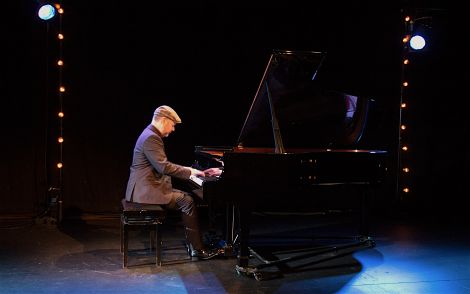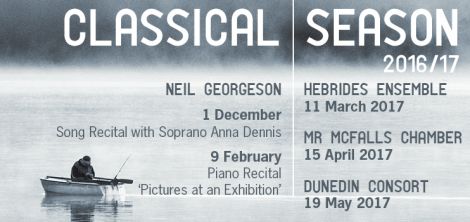Reviews / Review: Welcome home, Neil!
It’s been four years since Neil Georgeson played to a Shetland audience, on the then new stage of Mareel’s auditorium. On Thursday night, the prodigal son returned to an enthusiastic reception, writes Alex Garrick-Wright.
The seats were packed with eager fans, all clamouring to hear one of the isles’ most talented musicians play his home turf once again. He did not disappoint.
Neil’s feelings about being able to play Shetland once again were evident, as he addressed the audience warmly in Shetland dialect: “It’s fine to be home!”
Thursday’s concert, Island/Home, opened with Neil taking immediately to Mareel’s stately, and sadly under-utilised, Steinway grand piano for Beethoven’s Sonata in D Major (commonly known as The Tempest).
The Tempest is supposed to evoke Shakespeare’s tale of shipwreck on the magician Prospero’s island, starting fast, then slowing and softening before turning dreamlike and tense. It was dramatic and imaginative, and the subject matter set the tone of the evening.
Island/Home was dripping with subtext. Each one of the pieces was chosen to fit the twin themes of ‘island homes’ in various iterations; tunes about returning home, wanderers, homesickness, isles, and what keeps people from their homes.
While some of the pieces, such as Liszt’s Mal du Pays (Homesickness) and the Schubert/Liszt hybrid Der Leiermann (The Organ-Grinder) fit the theme and were beautifully played, other pieces were far more interesting.
One stand-out was Homeless Wanderer, by Tsegué-Maryam Guèbrou, an Ethiopian pianist and composer turned reclusive nun. Neil described how he was unable to get any sheet music of this composition, and so, amazingly, learned it by ear.
Described as a cross between “Ethiopian Orthodox music and pre-war jazz,” Homeless Wanderer was a fantastic, upbeat, intricate tune full of little bursts of intensity. That Neil was able to learn and reproduce a number of such technical complexity was incredible.
Become a member of Shetland News
He followed this with five of Grieg’s Lyric Pieces. Neil said that, while Grieg wrote 66 pieces in the set, it was traditional to choose a few that fit the ‘story’ the performer was trying to tell. In an autobiographical manner, he had chosen In my Homeland, Shepherd’s Boy, Butterfly, Lonesome Wanderer and Homeward Bound.
Strung together, the music did tell a story – cosy and warm at home, then dramatic and whimsical out on the journey, before becoming sad and nostalgic for home, and finishing jubilant and elated at returning. The last piece, Homeward Bound, was especially enjoyable, full of a joy and excitement which Neil was channelling, ending with a flourish and a wide grin. He looked really happy to be home.
One of the most interesting pieces of the night was Peter Ablinger’s Voice and Piano; three odd and contemplative pieces that were created by using spectral analysis on recordings of famous speeches, and turning these into piano compositions which are then played alongside the speeches themselves.
The speeches featured were Orson Welles telling the US government that they should have accepted more refugees in World War Two (but not communists), communist poet Bertolt Brecht being interrogated before an immigration panel, and communist activist Angela Davis on persecution.
It’s exactly as strange as it sounds, leading to uncomfortable, dissonant music which played over the top of the old recordings, obscuring the speeches themselves (in Brecht’s case, barely audible even without the piano). At first this seemed a bit of an oversight, but in reality it made the audience strain to hear the speech.
The dissonant piano gave a disquieting tone, and dropped quiet or paused altogether to allow certain parts to be heard clearly, be it certain words (“atrocity”) or phrases (“lynch-mob mentality”, and “I am a communist because I believe”, which was repeated in Davis’ speech a few times). It was strange, but gave much food for thought.
The highlight of the night was Farewell to Stromness by Peter Maxwell Davies, the late Orkney-resident composer, with whom Neil had worked. It was clear how much respect and admiration Neil had for him: “Davies did a lot of good for music in this country.”
Farewell was written in protest of a proposed (and never built) uranium mine on Orkney, and incredibly beautiful. Neil’s rendition was absolutely stunning, a mellow and sentimental piece brimming with a fond nostalgia that would have made Davies proud.
Neil closed with Debussy’s L’isle joyeuse, a dizzying and triumphant melody inspired by the Greek island of Kythera. As the destination of this musical journey, it worked very well, but didn’t quite push all the emotional buttons that Farewell did.
After a seemingly endless applause, Neil showed off with a rapid, passionate, whirlwind encore of Chopin’s Fantasie Impromptu that left jaws agape. A world-class performance.
“The December show will be much more exciting,” Neil promised with a grin. “It’s good to be home at Mareel.”
Welcome home, Neil. It’s been far too long.
Become a member of Shetland News
Shetland News is asking its many readers to consider paying for membership to get additional features and services: -
- Remove non-local ads;
- Bookmark posts to read later;
- Exclusive curated weekly newsletter;
- Hide membership messages;
- Comments open for discussion.
If you appreciate what we do and feel strongly about impartial local journalism, then please become a member of Shetland News by either making a single payment, or setting up a monthly, quarterly or yearly subscription.




























































